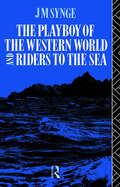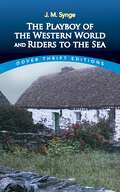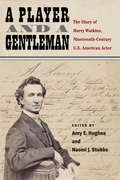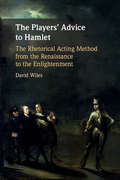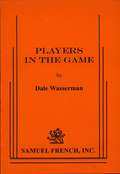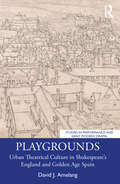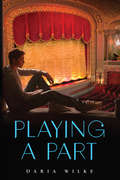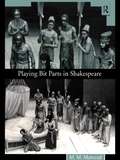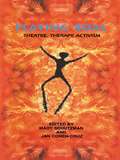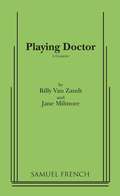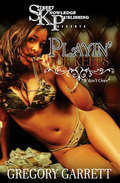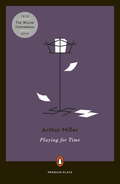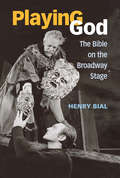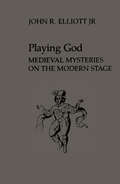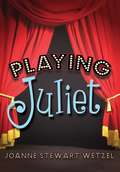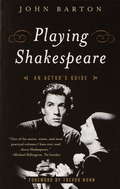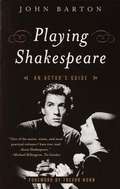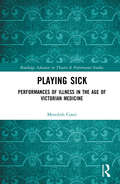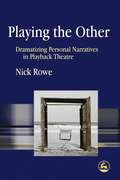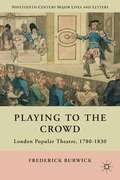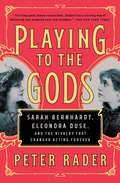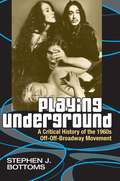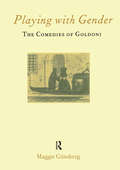- Table View
- List View
Playboy of the Western World: A Comedy In Three Acts (Classic, 20th-century, Penguin Ser.)
by J.M SyngeFirst published in 1979. Routledge is an imprint of Taylor & Francis, an informa company.
The Playboy of the Western World and Riders to the Sea (Dover Thrift Editions: Plays)
by J. M. SyngeTwo beautifully crafted dramas set among the folk of the Aran Islands and western Irish coastlands. The Playboy of the Western World deals with its young hero's progress, in the eyes of others, from timid weakling to paragon of bravery. Riders to the Sea is a dark elegy to the fragile existence of those who live at the mercy of the sea. Reprinted from authoritative editions, complete with Synge's preface to The Playboy of the Western World. New introductory Note.
A Player and a Gentleman: The Diary of Harry Watkins, Nineteenth-Century U.S. American Actor
by Amy E Hughes Naomi J StubbsHardworking actor, playwright, and stage manager Harry Watkins (1825–94) was also a prolific diarist. For fifteen years Watkins regularly recorded the plays he saw, the roles he performed, the books he read, and his impressions of current events. Performing across the U.S., Watkins collaborated with preeminent performers and producers, recording his successes and failures as well as his encounters with celebrities such as P. T. Barnum, Junius Brutus Booth, Edwin Forrest, Anna Cora Mowatt, and Lucy Stone. His is the only known diary of substantial length and scope written by a U.S. actor before the Civil War—making Watkins, essentially, the antebellum equivalent of Samuel Pepys. Theater historians Amy E. Hughes and Naomi J. Stubbs have selected, edited, and annotated excerpts from the diary in an edition that offers a vivid glimpse of how ordinary people like Watkins lived, loved, struggled, and triumphed during one of the most tumultuous periods in U.S. history. The selections in A Player and a Gentleman are drawn from a more expansive digital archive of the complete diary. The book, like its digital counterpart, will richly enhance our knowledge of antebellum theater culture and daily life in the U.S. during this period.
The Players' Advice to Hamlet: The Rhetorical Acting Method from the Renaissance to the Enlightenment
by David WilesHamlet is a characteristic intellectual more inclined to lecture actors about their craft than listen to them, and is a precursor of Enlightenment figures like Diderot and Lessing. This book is a quest for the voice of early professional actors, drawing on English, French and other European sources to distinguish the methods of professionals from the theories of intellectual amateurs. David Wiles challenges the orthodoxy that all serious discussion of acting began with Stanislavski, and outlines the comprehensive but fluid classical system of acting which was for some three hundred years its predecessor. He reveals premodern acting as a branch of rhetoric, which took from antiquity a vocabulary for conversations about the relationship of mind and body, inside and outside, voice and movement. Wiles demonstrates that Roman rhetoric provided the bones of both a resilient theatrical system and a physical art that retains its relevance for the post-Stanislavskian performer.
Players in the Game
by Dale WassermanDrama / 9m, 4f / Unit Set / The Bishop of fourteenth century Prague is humane, witty and happily immoral, which suits his city just fine. However, it displeases the Pope who sends a clever young Inquisitor to force obedience from the Bishop, triggering a collision that ends shockingly. You’ll recognize the game as that old, “Who’s Got The Power?” but you’ve never seen it played for such amazing stakes.
Playgrounds: Urban Theatrical Culture in Shakespeare’s England and Golden Age Spain (Studies in Performance and Early Modern Drama)
by David J. AmelangThis book compares the theatrical cultures of early modern England and Spain and explores the causes and consequences not just of the remarkable similarities but also of the visible differences between them. An exercise in multi-focal theatre history research, it deploys a wide range of perspectives and evidence with which to recreate the theatrical landscapes of these two countries and thus better understand how the specific conditions of performance actively contributed to the development of each country’s dramatic literature. This monograph develops an innovative comparative framework within which to explore the numerous similarities, as well as the notable differences, between early modern Europe’s two most prominent commercial theatre cultures. By highlighting the nuances and intricacies that make each theatrical culture unique while never losing sight of the fact that the two belong to the same broader cultural ecosystem, its dual focus should appeal to scholars and students of English and Spanish literature alike, as well as those interested in the broader history of European theatre. Learning from what one ‘playground’ – that is, the environment and circumstances out of which a dramatic tradition originates – reveals about the other will help solve not only the questions posed above but also others that still await examination. This investigation will be of great interest to students and scholars in theatre history, comparative drama, early modern drama, and performance culture.
Playing a Part
by Daria Wilke Marian SchwartzThe first young adult novel translated from Russian, a brave coming-out, coming-of-age story.In June 2013, the Russian government passed laws prohibiting "gay propaganda," threatening jail time and fines to offenders. That same month, in spite of these harsh laws, a Russian publisher released PLAYING A PART, a young adult novel with openly gay characters. It was a brave, bold act, and now this groundbreaking story has been translated for American readers.In PLAYING A PART, Grisha adores everything about the Moscow puppet theater where his parents work, and spends as much time there as he can. But life outside the theater is not so wonderful. The boys in Grisha's class bully him mercilessly, and his own grandfather says hateful things about how he's not "masculine" enough. Life goes from bad to worse when Grisha learns that Sam, his favorite actor and mentor, is moving: He's leaving the country to escape the extreme homophobia he faces in Russia. How Grisha overcomes these trials and writes himself a new role in his own story is heartfelt, courageous, and hopeful.
Playing a Part in History
by Margaret RogersonThe York Mystery Plays are a cycle of originally performed on wagons in the city. They date from the fourteenth century and Biblical narrative from Creation to Last Judgment. After nearly four hundred years without a performance, a revival of the York Mysteries began in 1951 when local amateurs led by professional theatre practitioners staged them during the festival of Britain. Playing a Part in History examines the ways in which the revival of these plays transformed them for twentieth- and twenty-first-century audiences. Considering such topics as the contemporary popularity of the plays, the agendas of the revivalists, and major production differences, Margaret Rogerson provides a fascinating comparison of medieval and modern English drama. Drawing extensively on archival material, and newspaper and academic reviews of the plays in recent years, Playing a Part in History is not only an illuminating account of early English drama, but also of the ways in which theatre allows people to interact with the past.
Playing Bit Parts in Shakespeare
by Professor M Mahood M.M. MahoodPlaying Bit Parts in Shakespeare is a unique survey of the small supporting roles - such as foils, feeds, attendants and messengers - that feature in Shakespeare's plays. Exploring such issues as how bit players should conduct themselves within a scene, and how blank verse or prose may be spoken to bring out the complexities of character-definition, Playing Bit Parts in Shakespeare brings a wealth of insights to the dynamic of scenic construction in Shakespeare's dramaturgy. M.M. Mahood explores the different functions of minimal characters, from clearing the stage to epitomizing the overall effect of the comedy or tragedy, and looks at how they can extend the audience's knowledge of the social world of the play. She goes on to describe the entire corpus of minimal roles in a selection of six plays: * Richard III * The Tempest * King Lear * Antony & Cleopatra * Measure for Measure * Julius Caesar This new edition comes enhanced with a new Appendix, 'Who Says What', especially designed to aid directors in making decisions about the speaking parts of the minimal characters. It also comes complete with an index of characters (including line references) as well as a detailed general index. An invaluable aid for directors and actors in the rehearsal room, this perceptive and informative volume is equally of interest to students studying and writing about Shakespeare's plays.
Playing Boal: Theatre, Therapy, Activism
by Mady Schutzman Jan Cohen-CruzPlaying Boal examines the techniques in application of Augusto Boal, creator of Theatre of the Oppressed, Brazilian theatre maker and political activist. This text looks at the use of the Theatre of the Oppressed exercises by a variety of practitioners and scholars working in Europe, North America and Canada. It explores the possibilities of these tools for "active learning and personal empowerment; co-operative education and healing; participatory theatre and community action." This collection is designed to illuminate and invigorate discussion about Augusto Boal's work and the transformative potential of theatre. It includes two interviews with Boal, and two pieces of his own writing.
Playing Doctor
by Billy Van ZandtFarce / 5m, 3f / Int. Rob Brewster's parents are very, very proud of their son the doctor. What they don't know is that Rob has used all the money they gave him for medical school to live on as he as has pursued his fledgling writing career. Inevitably, Rob's day of reckoning comes when his parents arrive for a visit. Quickly, he enlists the help of his secretary to be his nurse and his roommate Jimmy to round up his actor friends to pretend to be patients. Complications ensue when Jimmy decides he is such a good actor that he can impersonate all the patients, with the help of a trunk of costumes and bad dialects! The authors have written some zany farces but this one may just be their zaniest. It is great fun to perform, and great fun to see. "Wonderful... wacky comedy... will undoubtedly become standard dinner theatre fare across the country... contains more wit than is usual in sex farce." - Asbury Park Press
Playing For Keeps
by Gregory GarrettFaced with a 30 year sentence in Federal prison, Dontae can no longer hold on to the envisions of the outside life he left behind, including family. As hard as it may get, he is determined to do the time and not let the time do him. Offered a get out of jail free card, will he continue to favor his pride? Can he remain strong enough throughout the rest of his bid before the mental strees and anguish taking its roll? Q'Tee vowed to love, honor, and cherish for better or worse until death do us part. With her husband, Dontae serving a lengthy sentence, she won't stop at nothing to help free him. By any means neccessary! After re-acquainting herself with an old fling, Marco, she becomes side tracked momentarily by paths of lust, lies, and unbridled affection. Gradually, her world turns upside down. Surprisingly, Q'Tee soon will discover Marco is the ideal player that changes the game. Will Q Tee's love out weigh Dontae's pride?
Playing for Time (Penguin Plays)
by Arthur MillerA searing drama of the Holocaust--and the remarkable, moving story of the Auschwitz Women's Orchestra Paris, 1942. Fania Fénelon, a popular Jewish nightclub singer, is arrested by the occupying Germans. <P><P>Sent to Auschwitz in a packed freight-car, shorn of her hair, tattooed with an identifying number, starved, and subjected to harsh labor, she loses all traces of her former self. But her life at the camp changes dramatically when she is drafted into the Women's Orchestra, a desperate little ensemble that marches the prisoners out to work and gives concerts for the German high brass. Led by Alma Rosé, a sternly ambitious German-Jewish conductor who knows that her job is a matter of life and death, Fania and her fellow musicians must confront the horror taking place around them while pushing themselves to create beauty in the midst of despair. <P> Based on Fania Fénelon's memoir of the same name, Arthur Miller's Playing for Time was first produced as a CBS television drama starring Vanessa Redgrave before being adapted for the stage.
Playing God: The Bible On The Broadway Stage
by Henry Carl BialWhether we regard it as the collected inscriptions of an earlier oral tradition or as the divinely authored source text of liturgical ritual, the Bible can be understood as a sacred performance text, a framework for an instructional theater that performs the shared moral and ethical values of a community. It's not surprising, then, that playwrights have turned to the Bible as a source for theatrical adaptation. Biblical texts have inspired more than 100 Broadway plays and musicals, ranging from early spectacles like Ben-Hur (1899) to more familiar works such as Godspell and Jesus Christ Superstar. What happens when a culture's most sacred text enters its most commercial performance venue? Playing God focuses on eleven financially and/or critically successful productions, as well as a few notable Broadway flops that highlight the difficulties in adapting the Old and New Testaments for the stage. The book is informed by both performance studies and theater history, combining analysis of play-scripts with archival research into the actual circumstances of production and reception. Biblical plays, Henry Bial argues, balance religious and commercial considerations through a complex blend of spectacle, authenticity, sincerity, and irony. Though there is no magic formula for a successful adaptation, these four analytical lenses help explain why some biblical plays thrive while others have not.
Playing God: Medieval Mysteries on the Modern Stage
by John R. ElliottReligious drama was one of the most vital art forms of the medieval era. In medieval mystery plays, God appeared as one of the characters, along with angels, saints, the devil, and others. Until very recently however, the revival of interest in medieval culture has not included drama, beacuse of a lingering fear of blasphemy associated with the representation of God on the stage. In Britain this fear was the legacy of a theatrical censorship which has been exercised by the Lord Chamberlain's office for hundreds of years. Since that power was abolished in 1968, medieval religious, or mystery, plays are once again appearing on the stages of many countries. John R. Elliott Jr. studies the modern context of this important medieval genre. He begins by describing general attitudes towards religious drama from the time of the reformation, the popularity of the Oberammergaru Passion Play in Victorian times, and specific attempts by producers to overcome official hostility to religious plays. He traces the history of the major modern productions of the mystery cycles, such as the York Festival and the Bristol University performance of the Cornish Ordinalia, and provides information about the careers of the two leading pioneers of modern mystery-play production. The concluding chapter discusses the chief practical and aethetic problems involved in staging mystery plays for modern audiences, and assesses the overall importance of their revival in the larger context of British there today.
Playing Juliet
by Joanne Stewart WetzelBeth Sondquist, age twelve and a half, dreams of playing the part of Juliet. For now she’s just the cat in Cinderella, but one day, she’s determined to become a real actress. But all her hopes for an acting career come crashing down when the Oakfield Children’s Theater is slated to be closed. Its new owner has decided to make it into an adult theater, a real theater. Beth and her best friend, Zandy, are willing to do whatever it takes to save the theater, but their plans quickly go awry. When Beth’s father catches her sneaking back into her bedroom window well past bedtime, Beth is in big, big trouble. With eviction looming, the children’s theater director decides to close the theater with the same play the theater opened with fifty years ago--Romeo and Juliet. But Beth’s grounded for the next two weeks, and she won’t be able to try out. How will Beth pull off playing Juliet if she can’t even make tryouts? Playing Juliet is funny and honest and celebrates bravery and doing the right thing even when it gets you into trouble. It’s about having the courage to go after what you want and making your dreams come true. It’s also about friendship and family. As an almost-thirteen-year-old, Beth has a unique bond with thirteen-year-old Juliet, and she eventually recognizes just how silly and immature Juliet’s decisions are. Only Beth can play Juliet as the kid that she is. With a little bit of luck, maybe she’ll get her chance.
Playing Shakespeare
by John BartonNow in its first American edition, Playing Shakespeare is the premier guide to understanding and appreciating the mastery of the world's greatest playwright.Together with Royal Shakespeare Company actors-among them Patrick Stewart, Judi Dench, Ian McKellen, Ben Kingsley, and David Suchet-John Barton demonstrates how to adapt Elizabethan theater for the modern stage. The director begins by explicating Shakespeare's verse and prose, speeches and soliloquies, and naturalistic and heightened language to discover the essence of his characters. In the second section, Barton and the actors explore nuance in Shakespearean theater, from evoking irony and ambiguity and striking the delicate balance of passion and profound intellectual thought, to finding new approaches to playing Shakespeare's most controversial creation, Shylock, from The Merchant of Venice. A practical and essential guide, Playing Shakespeare will stand for years as the authoritative favorite among actors, scholars, teachers, and students.From the Trade Paperback edition.
Playing Shakespeare: An Actor's Guide
by John Barton Trevor NunnNow in its first American edition,Playing Shakespeare is the premier guide to understanding and appreciating the mastery of the world's greatest playwright. Together with Royal Shakespeare Company actors-among them Patrick Stewart, Judi Dench, Ian McKellen, Ben Kingsley, and David Suchet-John Barton demonstrates how to adapt Elizabethan theater for the modern stage. The director begins by explicating Shakespeare's verse and prose, speeches and soliloquies, and naturalistic and heightened language to discover the essence of his characters. In the second section, Barton and the actors explore nuance in Shakespearean theater, from evoking irony and ambiguity and striking the delicate balance of passion and profound intellectual thought, to finding new approaches to playing Shakespeare's most controversial creation, Shylock, from The Merchant of Venice. A practical and essential guide,Playing Shakespeare will stand for years as the authoritative favorite among actors, scholars, teachers, and students.
Playing Sick: Performances of Illness in the Age of Victorian Medicine (Routledge Advances in Theatre & Performance Studies)
by Meredith ContiFew life occurrences shaped individual and collective identities within Victorian-era society as critically as witnessing or suffering from illness. The prevalence of illness narratives within late nineteenth-century popular culture was made manifest on the period’s British and American stages, where theatrical embodiments of illness were indisputable staples of actors’ repertoires. Playing Sick: Performances of Illness in the Age of Victorian Medicine reconstructs how actors embodied three of the era’s most provocative illnesses: tuberculosis, drug addiction, and mental illness. In placing performances of illness within wider medicocultural contexts, Meredith Conti analyzes how such depictions confirmed or resisted salient constructions of diseases and the diseased. Conti’s case studies, which range from Eleonora Duse’s portrayal of the consumptive courtesan Marguerite Gautier to Henry Irving’s performance of senile dementia in King Lear, help to illuminate the interdependence of medical science and theatre in constructing nineteenth-century illness narratives. Through reconstructing these performances, Conti isolates from the period’s acting practices a lexicon of embodied illness: a flexible set of physical and vocal techniques that performers employed to theatricalize the sick body. In an age when medical science encouraged a gradual decentering of the patient from their own diagnosis and treatment, late nineteenth-century performances of illness symbolically restored the sick to positions of visibility and consequence.
Playing the Other: Dramatizing Personal Narratives in Playback Theatre
by Nick RoweThis book is an exploration and critique of 'playback theatre', a form of improvised theatre in which a company of performers spontaneously enact autobiographical stories told to them by members of the audience. With more than ten years' experience as an actor with Playback Theatre York, the author introduces the reader to the basics of playback theatre within a historical and theoretical context. The history and development of the form is traced, from its conception in the late 1970s to its subsequent growth worldwide, and its relationship to the psychodrama tradition from which it has evolved is discussed. Through an examination of playback performances from the perspectives of performers, `tellers' of their stories and the audience, the author critically explores the nature, implications and ethics of the performers' response to the teller's experience, how notions of the public and personal are constructed, and the risks involved in improvising a response to a member of the audience's story. Playing the Other will be essential reading for drama students, dramatherapists and all those interested in the history and use of the theatre.
Playing to the Crowd
by Frederick BurwickThe firststudy ofthe productions of the minor theatres, how theywere adapted toappealto the local patrons and the audienceswho worked and lived inthese communities. "
Playing to the Gods: Sarah Bernhardt, Eleonora Duse, and the Rivalry that Changed Acting Forever
by Peter RaderThe riveting story of the rivalry between the two most renowned actresses of the nineteenth century: legendary Sarah Bernhardt, whose eccentricity on and off the stage made her the original diva, and mystical Eleonora Duse, who broke all the rules to popularize the natural style of acting we celebrate today.Audiences across Europe and the Americas clamored to see the divine Sarah Bernhardt swoon—and she gave them their money’s worth. The world’s first superstar, she traveled with a chimpanzee named Darwin and a pet alligator that drank champagne, shamelessly supplementing her income by endorsing everything from aperitifs to beef bouillon, and spreading rumors that she slept in a coffin to better understand the macabre heroines she played. Eleonora Duse shied away from the spotlight. Born to a penniless family of itinerant troubadours, she disappeared into the characters she portrayed—channeling their spirits, she claimed. Her new, empathetic style of acting revolutionized the theater—and earned her the ire of Sarah Bernhardt in what would become the most tumultuous theatrical showdown of the nineteenth century. Bernhardt and Duse seduced each other’s lovers, stole one another’s favorite playwrights, and took to the world’s stages to outperform their rival in her most iconic roles. A scandalous, enormously entertaining history full of high drama and low blows, Playing to the Gods is the page-turning account of the feud that changed theater forever.
Playing Underground
by Stephen J. Bottoms"Scrupulously researched, critically acute, and written with care,Playing Undergroundwill become a classic account of an era of hard-won free expression. " -William Coco "At last---a book documenting the beginnings of Off-Off Broadway theater. Playing Undergroundis an insightful, illuminating, and honest appraisal of this important period in American theater. " -Rosalyn Drexler, author ofArt Does (Not!) ExistandOccupational Hazard "An epic movie of an epic movement,Playing Undergroundis a book the world has waited for without knowing it. How precisely it captures the evolution of our revolution! I am amazed by the book's scope and scale, and I bless its author especially for giving two greats, Paul Foster and H. M. Koutoukas, their proper, polar places, and for memorializing such unjustly forgotten masterpieces as Irene Fornes'sMolly's Dreamand Jeff Weiss'sA Funny Walk Home. Stephen Bottoms's vivid evocation of the grand adventure of Off-Off Broadway has woken and broken my heart. It is difficult to believe that he was not there alongside me to breathe the caffeine-nicotine-alkaloid-steeped air. " -Robert Patrick, author ofKennedy's ChildrenandTemple Slave Few books address the legendary age of 1960s off-off Broadway theater. Fortunately, Stephen Bottoms fills that gap withPlaying Underground---the first comprehensive history of the roots of off-off Broadway. This is a theater whose legacy is still felt today: it was the launching pad for many leading contemporary theater artists, including Sam Shepard, Maria Irene Fornes, and others, and it was a pivotal influence on improv comedy and shows likeSaturday Night Live. Off-off Broadway groups such as the Living Theatre, La Mama, and Caffe Cino captured the spirit of nontraditional theater with their edgy, unscripted, boundary-crossing subjects. Yet, as Bottoms discovers, there is no one set of truths about off-off Broadway to uncover; the entire scene was always more a matter of competing perceptions than a singular, concrete reality. No other author has managed to illuminate this shifting tableau as Bottoms does. Through interviews with dozens of the era's leading playwrights, performers, directors, and critics, he unearths a countercultural theater movement that was both influential and transforming-yet ephemeral and quintessentially of its moment. Playing Undergroundwill be a definitive work on the subject, offering a complete picture of an important but little-studied period in American theater.
Playing with Gender: The Comedies of Goldoni
by Maggie Gunsberg"This work takes gender as its point of entry into the comedies of Carlo Goldoni (1707-93). The dramatization of femininity and masculinity is explored in conjunction with that of other social categories (class, the family, and age). The plays reinforce the patriarchal association of femininity with the body, with spectacle, and with theatricality, while the dramatic backdrop of Venice and carnival provides a context for the staging of issues relating to identity, disguise and fashion. In the plays, pretence and theatricality vie with bourgeois Enlightenment values of morality, honesty and respectability to produce dramatic tension with distinct gender implications."

